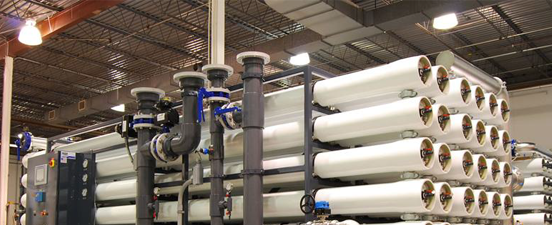Reverse Osmosis (RO)

In the reverse osmosis process cellophane-like membranes separate purified water from contaminated water. RO is when a pressure is applied to the concentrated side of the membrane forcing purified water into the dilute side, the rejected impurities from the concentrated side being washed away in the reject water.
RO can also act as an ultra-filter removing particles such as some micro-organisms that may be too large to pass through the pores of the membrane.
Advantages of RO Water Purification:
- RO water filters remove even the smallest particles from drinking water. Other methods of water purification like boiling and ultraviolet light, while destroying bacteria, do not remove particles of inorganic pollutants like metals and chemicals.
- A reverse osmosis water purifier has membrane filters that last a long time. In other types of water filtration systems, you need a new filter every two-four weeks.
- RO water filters are eco-friendly as they do not produce any chemicals.
- RO systems remove dissolved minerals and other contaminants that may cause water to smell unpleasant, and look odd.
- Reverse osmosis purification systems are best for home filtration systems because they are small in size.
- Water treated by RO water filters is ideal for people suffering from heart disease, because they eliminate almost all salt and remove 99% of bacteria and pyrogenic substances in the water.
- Reverse osmosis systems eliminate all heavy metals that are harmful to health, like lead, mercury and selenium, as well as animal waste and chemicals.
In Summary – an Reverse Osmosis will provide you the consumer the following benefits:
- Improves taste, odor and appearance of your water.
- Highly effective purification process. Will remove most pollutants found in the water.
- Consumes no energy
- Very convenient
- Flushes away pollutants, does not collect them
- Easy to keep clean
- Low production cost – gives you water of a guaranteed quality for pennies per gallon